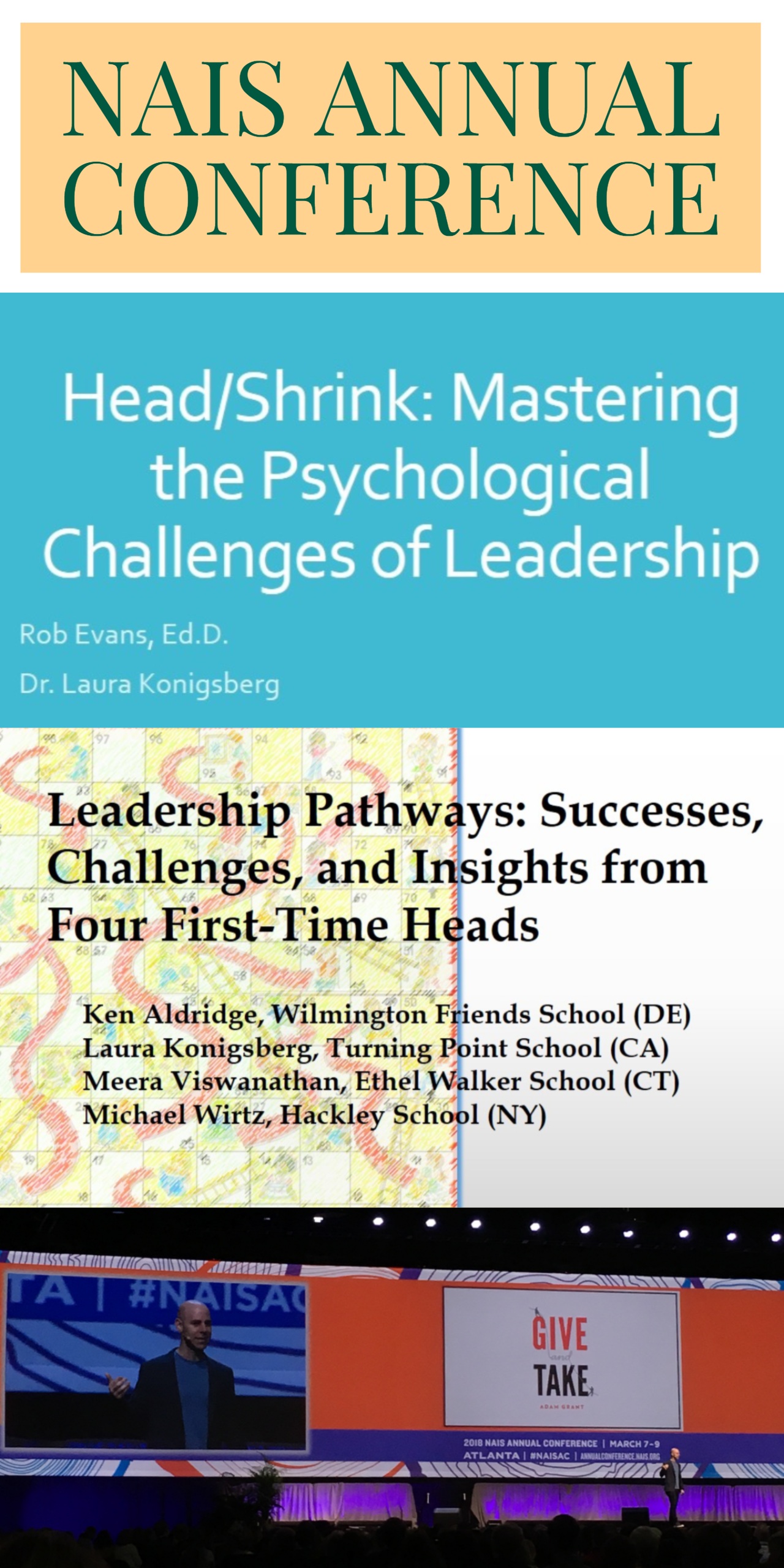 When heads of school gather together, as we do each year at the National Association of Independent Schools’ annual conference, many wise perspectives and revealing narratives emerge. We are a collegial and collaborative group, sharing knowledge and experiences formally, in workshops and seminars, and informally, over dinner or drinks. There is a lot of nodding as we compare notes about the triumphs and challenges of school leadership. We all relish our communities and the collective energy that emerges working toward a common goal, and we all soberly accept the ambiguity that is often encountered in the most difficult leadership decisions. I return with practical strategies and vigorous energy to continue to lead Turning Point School with wholehearted gratitude, unwavering dedication, and boundless joy.
When heads of school gather together, as we do each year at the National Association of Independent Schools’ annual conference, many wise perspectives and revealing narratives emerge. We are a collegial and collaborative group, sharing knowledge and experiences formally, in workshops and seminars, and informally, over dinner or drinks. There is a lot of nodding as we compare notes about the triumphs and challenges of school leadership. We all relish our communities and the collective energy that emerges working toward a common goal, and we all soberly accept the ambiguity that is often encountered in the most difficult leadership decisions. I return with practical strategies and vigorous energy to continue to lead Turning Point School with wholehearted gratitude, unwavering dedication, and boundless joy.
I was thrilled to help lead two of the workshops for this year’s annual conference in Atlanta, Georgia. Strong leadership—from the head of school to teacher leaders—depends on managing one’s self and regulating our emotions. When people take responsibility for self-awareness and the energy they bring into our schools, it can be transformational. I was honored to bring some insights into this conversation in my workshop, Head/Shrink: Mastering the Psychological Challenges of Leadership, in which my colleague, psychologist Rob Evans, and I discussed strategies for recognizing and managing the complex psychological dynamics that school leaders encounter, from straddling the boundary between personal and professional to managing resistance to change.
Fostering the next generation of school leaders has emerged as a high priority for NAIS. With this priority in mind, I was invited to serve on a panel describing pathways to headship, in a workshop entitled Leadership Pathways: Successes, Challenges, and Insights from Four First-Time Heads. Alongside three colleagues, representing a diversity of backgrounds and trajectories, we shared stories of our leadership journeys, insights of the first few years of headship, and wisdom to help others achieve their leadership goals.
Over the years, headship has changed from a “master teacher” model to a Chief Executive Officer model requiring agility, new skills and mindsets, and focus on external strategies. School leaders are faced with numerous decisions each day. In fact, as I learned in Dr. Michael Walker’s (Head of San Francisco Day School) workshop on Neuroscience of Learning and Leading, decisions we make are the single most important factor in our effectiveness—yet we don’t get trained in decision making. Decision making is hard; as Dr. Walker pointed out, life doesn’t offer us control groups. People tend to rely on heuristics, or unconscious mental shortcuts that allow us to solve problems and make judgments quickly. In fact, we are only aware of 5% of the decisions we make each day. It is easy, particularly in the midst of over-scheduled and multi-tasking days, to over-rely on heuristics and not really think consciously about how we use them.
Given the ambiguity involved in most decisions, and our small appetite for this uncertainty, we tend to decide quickly, but we need to build in the time to think critically in our decision-making. Brains prefer the status quo, because we have created robust neural networks that have become convenient. We benefit from developing new neural networks, even though it will create discomfort for us.
Because our survival instincts predispose us to look for problems, we tend to fall back on these well-worn neural pathways. But we are more creative and productive when we can bypass these instincts. Reframing “my concerns are” as “what might we do…” can minimize our fear, stress, and anxiety, to make way for new solutions.
As I returned home with these fresh experiences and mindsets burrowing new neural pathways in my brain, I feel invigorated by the work I have been called to do at Turning Point. I look forward to continuing to collaborate with our remarkable administrators, faculty, and staff—and in partnership with parents—as we strive to further position Turning Point School as a true center of vibrant, innovative, and evocative education.
Laura
Dr. Laura Konigsberg
Head of School

Dr. Konigsberg with co-presenters Ken Aldridge (Head at Wilmington Friends School) and Michael Wirtz (Head at Hackley School)


































